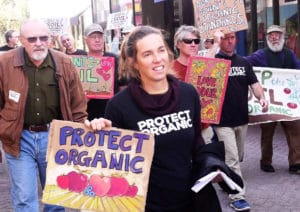Cornucopia’s Take: Continued frustration with the USDA’s watering down of organic standards and the lack of enforcement against giant scofflaws has spurred interest in an alternative food labels. We too believe that we have devolved into two organic labels. Cornucopia remains neutral on other labels, so that we can impartially evaluate them while we work to protect authentic organic farming.
More organic than thou? Rebel farmers create new food label
The Washington Post
by Lisa Rathke
 |
Cornucopia’s Senior Soil Scientist Source: Real Organic Program |
Was your tomato grown in dirt or water? Organic shoppers might notice additional labels this summer that will give them the answer — and tell them whether their choices align with what a rebellious group of farmers and scientists deem the true spirit of the organic movement.
About 15 farmers and scientists from around the country met in Vermont late last month to create the standards for an additional organic certification program, which they plan to roll out nationally to between 20 to 60 farms as a pilot this summer.
Under the current U.S. Department of Agriculture program, the organic label means that your tomato has been produced without synthetic substances — with some exceptions — and without certain methods, like genetic engineering. The additional label, which does not yet have a name or wording, would indicate that a tomato, for example, has been grown in soil, and that meat and dairy products came from farms that pasture their animals.
An inspector would certify that the farm has complied with the new standards, and the farms — not distributors — would add the label.
The move comes five months after the National Organic Standard Board, which advises the U.S. Department of Agriculture, voted against a proposal to exclude from the USDA’s organic certification program hydroponics — raising plants with water but no soil — and aquaponics, in which plants and aquatic animals, such as fish, are grown within one system.
“I think that a lot of farmers, especially young farmers, feel that the organic label no longer describes the way they farm, and we’re trying to recapture that,” said Linley Dixon, a vegetable farmer in Durango, Colorado, and senior scientist for Cornucopia Institute, who is also on the standards board of the Real Organic Project.
Read the entire article at The Washington Post.

